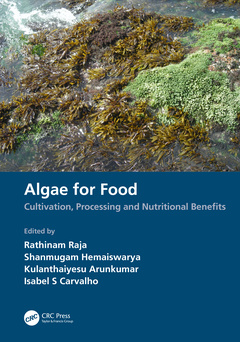Description
Algae for Food
Cultivation, Processing and Nutritional Benefits
Coordinators: Raja Rathinam, Hemaiswarya Shanmugam, Arunkumar Kulanthaiyesu, Carvalho Isabel S.
Language: English
Subjects for Algae for Food:
Keywords
SPs; Kappaphycus Alvarezii; Marine Macroalgae; Dunaliella Salina; Brown Algae; Red Algae; Flat Panel PBR; Marine Algae; Edible Seaweeds; Photosynthetic Efficiency; Algal Biomass; LHC; Brown Seaweeds; Pavlova Lutheri; Arthrospira Platensis; Haematococcus Pluvialis; LNCaP; Euglena Gracilis; Sea Vegetables; Controlling Lung Cancer; Algal Polysaccharides; Algal Food; Par Region; HMEC-1 Cell; Short Chain Fatty Acid
· 17.8x25.4 cm · Hardback
Description
/li>Contents
/li>Readership
/li>Biography
/li>
Algae for Food: Cultivation, Processing and Nutritional Benefits
Algae are a primitive, living photosynthetic form and they are the oldest living organism. In the marine ecosystem, algae are the primary producers that supply energy required to a diverse marine organism and especially seaweed provides a habitat for invertebrates and fishes. There have been significant advances in many areas of phycology. This book describes the advances related to food and nutrition of algae achieved during the last decades, it also identifies gaps in the present knowledge and needs for the future. The 17 chapters, grouped into 6 parts, are written by phycologists. More insight on industrial exploitation of algae and their products is supported by current studies and will help academia. The first part explains new technologies to improve the microalgal biomass, strain improvement and different methods of seaweed cultivation. In the second part, food and nutraceutical applications of algae, food safety aspects, green nanotechnology and formulation methods for the extraction and isolation of algal functional foods are described. The third part deals with pigments and carotenoids while the fourth part exploits the isolation and application of hydrocolloids, nutritional implications of algal polysaccharides and the characterization and bioactivity of fucoidans. In the fifth part, the biomedical potential of seaweed followed by agricultural applications of algae are well described. The book is an important resource for scholars that provides knowledge on wide range of topics.
Key Features
- Covers important fields of algae from biomass production to genetic engineering aspects of algae
- Useful in the field of algal biotechnology, aquaculture, marine micro and macrobiology, microbial biotechnology and bioprocess technology
- Focuses on the therapeutic and nutritional areas of algae
Dr. Rathinam Raja pursued his Ph.D. in microalgae at University of Madras on 2004. Currently he is working as an Auxiliary Investigator at University of Algarve, Faro, Portugal. Previously worked in different countries (Taiwan, South Korea and IIT Madras) as a Post-Doctoral Scientist. He also worked as a Lead Scientist at Aquatic Energy LLC, Louisiana for couple of years. He has published 27 international articles and 11 book chapters.
Dr. Shanmugam Hemaiswarya, received her Ph.D from Department of Biotechnology, IIT Madras, India followed by research experience at University of Algarve, Portugal. She received a three year Women Scientist (WOS-A) fellowship from Department of Science and Technology, India and completed the project at AUKBC Research Centre, Anna University, Chennai. She is currently working as a Project Officer at Department of Biotechnology, IIT Madras. She has published 28 international publications, 12 book chapters and co-authored a book.
Prof. K. Arunkumar obtained his M.Sc. in Botany and Master of Philosophy in Botany from Bharathidasan University and Ph.D. from University of Madras, India during 1999. Having specialized in physiology and extraction chemistry, he worked in Rubber Research Institute of India during 1997-1999. Later, he joined as an Assistant Professor in the year 1999. Since then he is concentrating on applied researches of algal diversity, biology and biochemistry. He has published 62 research articles of which 40 are Scopus indexed and guided 5 Ph.D’s by attracting grants from Government of India funding Agencies (UGC/DST/SERB). He offers 4 credits MOOC Biomass Characterization for Postgraduates through UGC-SWAYAM portal. Currently he is heading the Department of Plant Sciences and Dean of student welfare, Central University of Kerala, India.
Dr. Isabel S Carvalho pursued Ph.D. in Plant Biochemistry at University of Lisbon, Portugal. She




